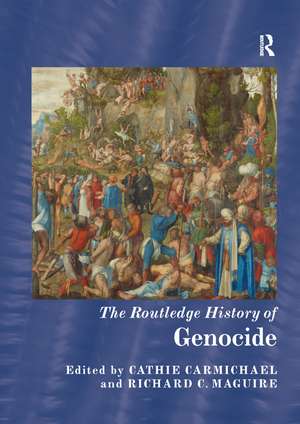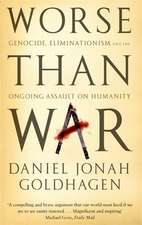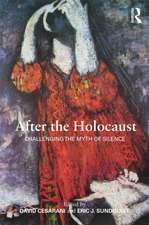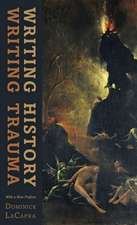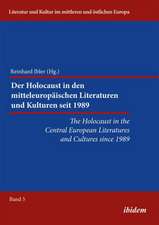The Routledge History of Genocide: Routledge Histories
Editat de Cathie Carmichael, Richard C. Maguireen Limba Engleză Paperback – 12 dec 2019
- genocide and the end of the Ottoman Empire
- Stalin and the Soviet Union
- Iron Age warfare
- genocide and religion
- Japanese military brutality during the Second World War
- heritage and how we remember the past.
The volume is global in scope, something of increasing importance in the study of genocide. Presenting genocide as an extremely diverse phenomenon, this book is a wide-ranging and in-depth view of the field that will be valuable for all those interested in the historical context of genocide.
| Toate formatele și edițiile | Preț | Express |
|---|---|---|
| Paperback (1) | 312.43 lei 6-8 săpt. | |
| Taylor & Francis – 12 dec 2019 | 312.43 lei 6-8 săpt. | |
| Hardback (1) | 1243.49 lei 6-8 săpt. | |
| Taylor & Francis – 8 mai 2015 | 1243.49 lei 6-8 săpt. |
Din seria Routledge Histories
-
 Preț: 350.19 lei
Preț: 350.19 lei -
 Preț: 366.82 lei
Preț: 366.82 lei -
 Preț: 349.09 lei
Preț: 349.09 lei -
 Preț: 360.94 lei
Preț: 360.94 lei -
 Preț: 347.07 lei
Preț: 347.07 lei -
 Preț: 351.63 lei
Preț: 351.63 lei - 18%
 Preț: 1612.01 lei
Preț: 1612.01 lei -
 Preț: 346.54 lei
Preț: 346.54 lei -
 Preț: 343.48 lei
Preț: 343.48 lei -
 Preț: 449.15 lei
Preț: 449.15 lei -
 Preț: 426.45 lei
Preț: 426.45 lei - 12%
 Preț: 325.34 lei
Preț: 325.34 lei - 12%
 Preț: 344.68 lei
Preț: 344.68 lei -
 Preț: 458.67 lei
Preț: 458.67 lei - 25%
 Preț: 1310.01 lei
Preț: 1310.01 lei - 11%
 Preț: 309.28 lei
Preț: 309.28 lei - 18%
 Preț: 1561.26 lei
Preț: 1561.26 lei -
 Preț: 434.54 lei
Preț: 434.54 lei -
 Preț: 501.41 lei
Preț: 501.41 lei - 9%
 Preț: 1490.32 lei
Preț: 1490.32 lei - 18%
 Preț: 1393.29 lei
Preț: 1393.29 lei - 11%
 Preț: 307.67 lei
Preț: 307.67 lei - 25%
 Preț: 1198.05 lei
Preț: 1198.05 lei - 13%
 Preț: 318.12 lei
Preț: 318.12 lei - 26%
 Preț: 1218.32 lei
Preț: 1218.32 lei -
 Preț: 509.50 lei
Preț: 509.50 lei - 17%
 Preț: 296.80 lei
Preț: 296.80 lei - 29%
 Preț: 1244.73 lei
Preț: 1244.73 lei -
 Preț: 436.14 lei
Preț: 436.14 lei -
 Preț: 448.33 lei
Preț: 448.33 lei - 38%
 Preț: 1209.99 lei
Preț: 1209.99 lei - 26%
 Preț: 1100.24 lei
Preț: 1100.24 lei - 32%
 Preț: 1287.32 lei
Preț: 1287.32 lei - 26%
 Preț: 1217.15 lei
Preț: 1217.15 lei
Preț: 312.43 lei
Preț vechi: 356.63 lei
-12% Nou
Puncte Express: 469
Preț estimativ în valută:
59.78€ • 62.59$ • 49.47£
59.78€ • 62.59$ • 49.47£
Carte tipărită la comandă
Livrare economică 05-19 aprilie
Preluare comenzi: 021 569.72.76
Specificații
ISBN-13: 9780367867065
ISBN-10: 0367867060
Pagini: 364
Dimensiuni: 174 x 246 x 25 mm
Greutate: 0.45 kg
Ediția:1
Editura: Taylor & Francis
Colecția Routledge
Seria Routledge Histories
Locul publicării:Oxford, United Kingdom
ISBN-10: 0367867060
Pagini: 364
Dimensiuni: 174 x 246 x 25 mm
Greutate: 0.45 kg
Ediția:1
Editura: Taylor & Francis
Colecția Routledge
Seria Routledge Histories
Locul publicării:Oxford, United Kingdom
Public țintă
Postgraduate and UndergraduateCuprins
List of figures. List of tables. Acknowledgements. List of contributors. 1. Introduction: Raphael Lemkin, Historians and Genocide Cathie Carmichael Genocide in Historical Contexts 2. Genocide and mass-murder in Second Iron Age Europe: Methodological issues and case studies in the Iberian Peninsula Fernando Quesada-Sanz 3. Tudor Ireland: Anglicisation, mass killing, and security David Edwards 4. To whom do the children belong? Genocidal Displacement in Europe and Australia Simone Gigliotti 5. The Great Purge in Ukraine: The German Оperation of the NKVD (1937—1938) Volodymyr Semystyaha and Igor Tatarinov 6. Expulsions from Eastern Europe after 1945 Benjamin Lieberman 7. Responding to the Holocaust: Bystanders, Colonialism and Conflicting Priorities Jennifer Reeve Genocide and Ideologies of Race, Class and Nation 8. The Perfect Storm: Japanese Military Brutality during World War Mark Felton 9. Cambodia: Paranoia, Xenophobia, Genocide and Auto-Genocide T.O. Smith 10. The Great Ukrainian Famine of 1932-3 Nicholas Werth 11. Rethinking Violence: Motives and Modes of Mass Murder in the Independent State of Croatia 1941-1945 Tomislav Dulić 12. Genocide in the Great Lakes René Lemarchand Interpreting Genocide 13. Heritage and Remembering the Past Rebecca Jinks 14. Writing ‘History’ for Hitler: Holocaust Denial since 1945 Mark Hobbs 15. ‘White Genocide': Post-war Fascism and the Ideological Value of Evoking Existential Conflicts Paul Jackson 16. ‘Those who have the sin... go to this side’. Genocide and Religion Kate Temoney 17. Cultural Genocide: Destruction of Material and Immaterial Human Culture Uğur Ümit Üngör Mass Violence, War and Genoci
Notă biografică
Cathie Carmichael is Professor of History at the University of East Anglia and has been Head of School since 2012. She is the author and editor of several books including Slovenia and the Slovenes: A Small State in the New Europe (2000) (with James Gow), Language and Nationalism in Europe (2000) (co-edited with the late Stephen Barbour), Ethnic Cleansing in the Balkans: Nationalism and the Destruction of Tradition (2002) and Genocide before the Holocaust (2009). She is an editor of the Journal of Genocide Research.
Richard C. Maguire is Associate Dean for Employability and Senior Lecturer in Public History in the Faculty of Humanities at the University of East Anglia. He has written on the culture of British nuclear policy and now researches public history, focussing on public understandings of African and military history.
Richard C. Maguire is Associate Dean for Employability and Senior Lecturer in Public History in the Faculty of Humanities at the University of East Anglia. He has written on the culture of British nuclear policy and now researches public history, focussing on public understandings of African and military history.
Recenzii
"One of this impressive volume's many virtues is the inclusion of little-known cases along with coverage of the twentieth century's mega-genocides by experts from many countries. This is a standout volume in an increasingly crowded field."
Dirk Moses, European University Institute, Italy
"It is time to further explore genocide in its global scope. This brilliant collection of essays comes right in time: From Siberia to Australia, from Los Alamos to Srebrenica, this volume presents genocide as a phenomenon in its full diversity and its global spread."
Alexander Korb, University of Leicester, UK
"Using the concept of "genocide" as a broad category of analysis, the essays in this volume address important questions about the history of mass violence around the globe. Revealing the historical, geographical, and ideological variety of genocidal acts — and highly attuned to the complexity of this sensitive subject — the book offers valuable insights into the history of violence and will be useful for researchers and teachers in a wide range of fields."
Karl Gunther, University of Miami, USA
"One of this impressive volume's many virtues is the inclusion of little-known cases along with coverage of the twentieth century's mega-genocides by experts from many countries. This is a standout volume in an increasingly crowded field."
Dirk Moses, European University Institute, Italy
"It is time to further explore genocide in its global scope. This brilliant collection of essays comes right in time: From Siberia to Australia, from Los Alamos to Srebrenica, this volume presents genocide as a phenomenon in its full diversity and its global spread."
Alexander Korb, University of Leicester, UK
"Using the concept of "genocide" as a broad category of analysis, the essays in this volume address important questions about the history of mass violence around the globe. Revealing the historical, geographical, and ideological variety of genocidal acts — and highly attuned to the complexity of this sensitive subject — the book offers valuable insights into the history of violence and will be useful for researchers and teachers in a wide range of fields."
Karl Gunther, University of Miami, USA
"...this is an impressive undertaking that provides a comprehensive investigation of genocide in the twentieth century. The selections are probably a bit dense for undergraduate students, but the collection certainly justifies inclusion in a graduate course on the topic of genocide and is an absolute necessity as a resource for anyone who teaches an undergraduate course on the subject. The contributors should be applauded for articulating a theoretical framework that provokes critical inquiry and avoids uncompromising conclusions."
Alan Rosenfeld, University of Hawai'i-West O'ahu, World History Connected
"This collection of essays brings together some of the best of the established and new voices of comparative genocide studies. By liberating genocide from its narrow legalistic concept and application, the contributors open up new historical and geographical areas to research into population displacement, settler colonialism, state and local mass atrocities and memory and commemoration of genocide and state-sponsored killings. In doing so, it expands our horizons to better recognize the social, economic, political and cultural conditions that make genocide and mass atrocities possible and hopefully work to prevent them."
Christopher E. Mauriello, Salem State University, US
Dirk Moses, European University Institute, Italy
"It is time to further explore genocide in its global scope. This brilliant collection of essays comes right in time: From Siberia to Australia, from Los Alamos to Srebrenica, this volume presents genocide as a phenomenon in its full diversity and its global spread."
Alexander Korb, University of Leicester, UK
"Using the concept of "genocide" as a broad category of analysis, the essays in this volume address important questions about the history of mass violence around the globe. Revealing the historical, geographical, and ideological variety of genocidal acts — and highly attuned to the complexity of this sensitive subject — the book offers valuable insights into the history of violence and will be useful for researchers and teachers in a wide range of fields."
Karl Gunther, University of Miami, USA
"One of this impressive volume's many virtues is the inclusion of little-known cases along with coverage of the twentieth century's mega-genocides by experts from many countries. This is a standout volume in an increasingly crowded field."
Dirk Moses, European University Institute, Italy
"It is time to further explore genocide in its global scope. This brilliant collection of essays comes right in time: From Siberia to Australia, from Los Alamos to Srebrenica, this volume presents genocide as a phenomenon in its full diversity and its global spread."
Alexander Korb, University of Leicester, UK
"Using the concept of "genocide" as a broad category of analysis, the essays in this volume address important questions about the history of mass violence around the globe. Revealing the historical, geographical, and ideological variety of genocidal acts — and highly attuned to the complexity of this sensitive subject — the book offers valuable insights into the history of violence and will be useful for researchers and teachers in a wide range of fields."
Karl Gunther, University of Miami, USA
"...this is an impressive undertaking that provides a comprehensive investigation of genocide in the twentieth century. The selections are probably a bit dense for undergraduate students, but the collection certainly justifies inclusion in a graduate course on the topic of genocide and is an absolute necessity as a resource for anyone who teaches an undergraduate course on the subject. The contributors should be applauded for articulating a theoretical framework that provokes critical inquiry and avoids uncompromising conclusions."
Alan Rosenfeld, University of Hawai'i-West O'ahu, World History Connected
"This collection of essays brings together some of the best of the established and new voices of comparative genocide studies. By liberating genocide from its narrow legalistic concept and application, the contributors open up new historical and geographical areas to research into population displacement, settler colonialism, state and local mass atrocities and memory and commemoration of genocide and state-sponsored killings. In doing so, it expands our horizons to better recognize the social, economic, political and cultural conditions that make genocide and mass atrocities possible and hopefully work to prevent them."
Christopher E. Mauriello, Salem State University, US
Descriere
Genocide Studies is a rapidly expanding field, benefiting greatly from global perspectives. Interdisciplinary in style while retaining a clear historical focus, The Routledge History of Genocide looks at much of recorded human history to examine episodes of extreme violence that could be interpreted as genocidal in a sens
